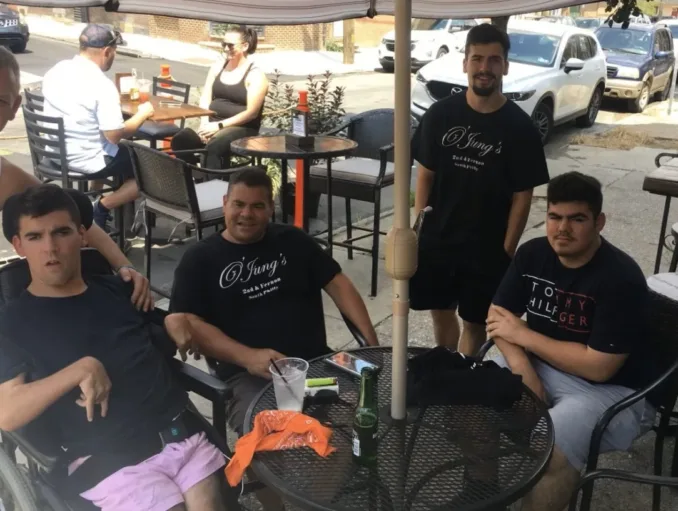Philadelphia Jail Killed Man by Depriving Him of Insulin, Lawsuit Says
Staff at Philadelphia’s Curran Fromhold Correctional Facility allegedly did not give Louis Jung Jr. his insulin for six straight days. Jung’s family says his treatment exemplifies how the jail treats everyone.

Staff at a Philadelphia jail killed Louis Jung, Jr., who had type 1 diabetes, by depriving him of insulin for six consecutive days, according to a lawsuit filed today by two of his sons.
Jung’s sons are suing, among others, the City of Philadelphia, the former commissioner of the Philadelphia Department of Prisons (PDP), and the jail’s for-profit medical provider, YesCare—formerly known as Corizon Health.
“Because of PDP’s grossly inadequate policies and practices, Mr. Jung died from a preventable medical catastrophe that should have been avoided through adherence to basic medical standards of care for type I diabetes,” the complaint says.
In an email to The Appeal, a spokesperson for the city wrote, “Thank you for reaching out. The City is reviewing the complaint and declines to comment.”
About two million Americans live with type 1 diabetes, an incurable autoimmune disease in which a person’s pancreas ceases making insulin. People with type 1 diabetes typically obtain insulin through injections or a pump. Without insulin, they develop diabetic ketoacidosis (DKA), a life-threatening condition that requires immediate hospitalization.
People with type 1 diabetes are protected by the Americans with Disabilities Act. But jails and prisons often ignore obligations to provide care and fail to follow the guidelines set by the American Diabetes Association.
The suit says medical staff did not consistently give Jung his prescribed insulin or monitor and document Jung’s glucose levels. While at Curran-Fromhold Correctional Facility, he was hospitalized multiple times with DKA. His first hospital stay occurred just four days after he arrived.
The suit says that in the last six days of his life, the facility gave him no insulin at all.

Jung’s son Jacob said he and his father were together almost every day before he went to jail.
“We’d always want to make him proud of what we were doing,” Jacob told The Appeal. Jacob said he taught him how to work on cars and fix houses.
“If he was given the proper medical attention from day one, he probably would be here right now, watching me get ready for work,” he said.
Jung left behind three sons and one granddaughter.
“He just loved the togetherness of family, and he loved the holidays,” his ex-wife, Evelyn, told The Appeal. “He just always wanted to make them great for me and the kids.”
Evelyn said the couple remained friends after they divorced, but while he was in jail, he wasn’t in touch with her or their sons.
“He didn’t want, I guess, to upset us,” she said.
Jung arrived at the Philadelphia jail in December 2021. In March 2023, he was transferred to Norristown Psychiatric Hospital for a competency evaluation. When he returned to the jail on October 28, the suit says his blood sugar was dangerously high—over 500—and he reported to the nurse practitioner that he had not received insulin for three days.
Even though he needed immediate medical attention, he was allegedly not hospitalized or assigned to the infirmary.
The family’s lawyer told The Appeal that the nurse administered insulin, but did not record how much. She did not administer a urine test for ketones at any point, which can indicate a person is in DKA.
The suit says the nurse recorded demonstrably false information on the screening form. She allegedly said Jung had not been transferred from Norristown Hospital and was not taking prescriptions for any medical conditions, including diabetes.
Jung’s situation quickly became even more dire. The suit says that for the next several days, medical staff rarely administered his prescribed insulin and often did not perform glucose checks, which are done with a finger stick. The complaint alleges that between November 1 and November 6, the day of his death, the medical staff did not provide him with any insulin or glucose checks.
Jung’s sons have enlisted the help of the Abolitionist Law Center, a nonprofit legal aid group. Bret Grote, the organization’s legal director, told The Appeal that Jung’s death is indicative of the jail and medical provider’s consistent disregard for incarcerated people’s lives. In 2021, 22-year-old Rahsaan Chambers developed DKA while detained at Curran-Fromhold. When he was finally taken to the hospital, he fell into a vegetative state and died.
Grote said Jung received the facility’s standard level of treatment—which meant “not providing care, letting people’s symptoms go untreated, letting chronic illnesses go untreated, playing a type of Russian roulette with their lives.” In July, the City of Philadelphia was found in contempt of court for not complying with the terms of a settlement agreement mandating improvements at the jail.
“This is just a chronic problem in the Philadelphia Department of Prisons that officials are aware of, and they cannot be bothered enough to make any serious efforts to remedy the issues despite multiple years of litigation and court orders,” Grote told The Appeal.
Jacob and his mother, Evelyn, said they hope the lawsuit will hold those who caused Jung’s death accountable and help prevent tragedies like this from occurring again.
“My kids are left with this void because his life was cut short because of no medical attention,” Evelyn said. “We will grieve for this forever.”
